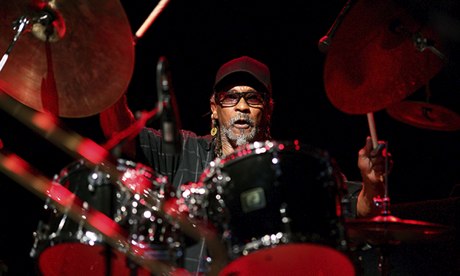
For any jazz fan raised on 1950s caricatures about drummers – that jazz players were cool, Italian-suited and swung with no more effort than if they were dealing cards, while rock drummers were loud, theatrical and obvious – the arrival of Ronald Shannon Jackson was a rude shock. Jackson, who has died from leukaemia aged 73, was a dramatically exciting drummer and one of the most uncompromisingly fearsome exponents of the post-1960s fusion sometimes called "punk jazz" or "no wave", a loose amalgam of free-jazz, world-music rhythmic inspirations and rock. The antithesis of the tastefully discreet accompanist, he was a force of nature at the kit.
Jackson's often thunderous directness appealed to such pioneering leaders as Charles Mingus, Ornette Coleman, Albert Ayler, the vocalist Betty Carter, and the pianists Cecil Taylor and McCoy Tyner. From 1979, he took to running his own groundbreaking groups (including the long-running Decoding Society) and performing with European radicals including Peter Brötzmann and Albert Mangelsdorff, as well as such uncategorisable American originals as John Zorn and Bill Frisell. His style was his own and it gave every band he played in an exuberant, dishevelled and liberating drive.
Jackson was born in Fort Worth, Texas. His mother, Ella Mae, was a church organist, and his father, William, sold records and jukeboxes from Fort Worth's only black-owned record shop. Jackson learned drums from childhood, went to the same school as the Coleman saxophonist Dewey Redman and by his mid-teens was playing with the saxophonist James Clay – a key figure in the Texas jazz scene of the 1950s and an early influence on Coleman.
In 1966, Jackson moved to New York, becoming a university student as well as a sideman with Mingus, Carter and Jackie McLean. For much of that year, Jackson worked with the soulful and sublimely intense saxophonist Ayler, participating in the famous May Day 1966 session at Slug's Saloon.
Drug problems led Jackson to withdraw from playing from 1970 to 1975, but he regained his health, discovered Buddhism and returned as part of the engine-room of Coleman's Prime Time. This controversial band was Coleman's typically distinctive take on jazz-rock fusion, which frequently sustained long, high-energy, multilayered rhythmic trances (Jackson often played drums in tandem with Coleman's son Denardo) rather than offering conventional themes and variations. Ornette Coleman favoured an approach to group improvisation he dubbed "harmolodics" – in which rhythm, melody and harmony could all be varied on the fly by players sufficiently attuned to the method; this influenced Jackson's own work.
During his Prime Time period, Jackson worked briefly with the harmolodic guitarist James "Blood" Ulmer before forming his first Decoding Society. Though the band was often described only in terms of the volume it put out, Jackson's range and depth were always evident – from street-march grooves to blues, bebop, rock and funk. His ability to sustain multiple and ostensibly contradictory rhythms simultaneously could be breathtaking, and he also took to playing the flute and the German double-reed schalmei horn with the group.
In 1983 Jackson brought a version of the band to Camden Jazz Week (the forerunner of the London Jazz festival), an event memorable for the slamming percussion effects he played on a massive sculpture-like structure festooned with cymbals and tom-toms; a rumbling underpinning furnished by two bassists who virtually morphed into a second drummer; and grippingly sleazy, street-corner melodic ideas which sounded like themes from some distant-galaxy cop show.
Jackson summed up the inclusiveness of his approach in a New York Times interview in 1982: "I think the African phrases are very obvious. I think the funk phrases are very obvious. I think the oriental phrases are obvious. I think the Bulgarian rhythms are there – I hear all of it." The improvising violinist Billy Bang, the saxophonist Charles Brackeen and the guitarist Vernon Reid were among the many Decoding Society members with powerful musical identities of their own and the ensemble made several acclaimed albums, including Mandance (1982) and Decode Yourself (1985).
Jackson worked with the German free-jazz firebrand Brötzmann, the noise-guitarist Sonny Sharrock and the producer/bassist Bill Laswell in the fierce thrash-metal improv group Last Exit (1986-94); with the world-jazz SXL ensemble featuring Laswell, the Indian violinist L Shankar and percussionists from Africa and South Korea; and, in 1987, with the bass guitarist Melvin Gibbs and Frisell in the co-operative fusion trio Power Tools. With a variety of guitarists and saxophonists – including, on What Spirit Say (1994), the stylistically flexible Detroit sax star James Carter – Jackson continued to steer Decoding Society's development.
Nerve injury to his left arm halted his playing from 2000 to 2005, but Jackson returned to work, with the trumpeter Wadada Leo Smith and the pianist Vijay Iyer, in Golden Quartet, and played publicly with his last Decoding Society in Dallas in July 2012.
An active educator and an inspiration to free-thinking musicians from many perspectives, he combined the raw excitement of rock, the articulate freedoms of jazz and the communality of many of the world's traditional musics with a passionate energy that transformed every band he led or joined, and stretched received wisdoms about the equality and intimacy of melody, harmony and rhythm in the process.
Jackson is survived by his wife, Natalie; his sons, Talkeye, Gregory and Clifford, and his daughter, Sunday; three grandchildren and a great-grandson.
• Ronald Shannon Jackson, drummer, born 12 January 1940; died 19 October 2013

